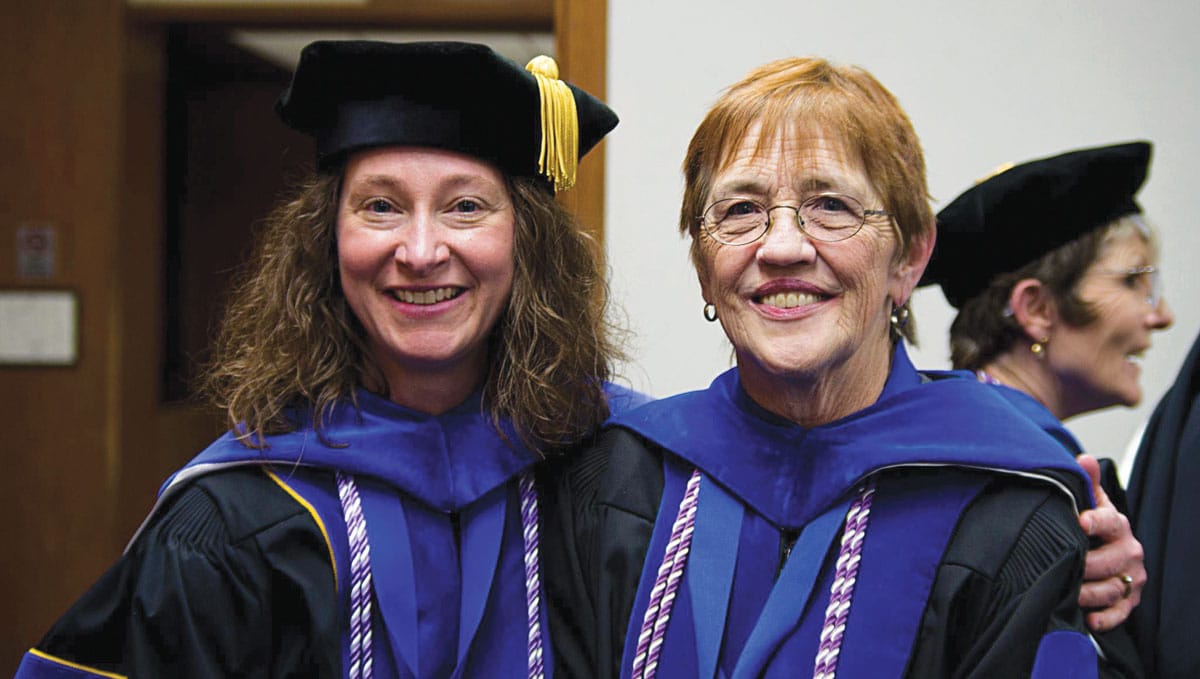
To Mary Gunther (’91, ’92, ’01) the phrase “Volunteer family” rang especially true. At first a student and later a faculty member of the College of Nursing, she loved her classmates, colleagues, and students. Some exchanged gifts with her during holidays; others named pets in her honor and even stayed by her side in the final moments of her life.
“She left fingerprints not only on me and my career but also many other students,” says Shelia Swift, executive associate dean of academic affairs for the College of Nursing. “She was quirky and had such a funny sense of humor. She was so intelligent, which could be kind of intimidating to a student, but she was also very encouraging. She was a mentor, challenging me to go out of my comfort zone. I took my first leadership role in the college because of her influence, and now I hold one of the positions she once held.
“She was my dissertation chair while I was a graduate student, and we became very close over the years. If she cared about you, you knew it, and I was fortunate to be part of her close-knit circle of friends.”
Gunther’s biological family passed away long before she did in 2021, but she built another family for herself at UT. She got her start as a pediatric nurse in her hometown of Chicago, where she attended nursing school. She moved to Knoxville to work in pediatrics at UT Medical Center, where she ascended to administrative positions of director of pediatrics and director of nursing resources while attending UT. Her Volunteer journey began with her nursing degrees (bachelor’s, master’s, and doctorate), and she joined nursing faculty in 2001.
Her academic career as student and professor was well decorated, including a graduate faculty award from UT. She built a significant body of scholarly work around theoretical discussions of empathy and lived experiences of nurses in the field and shared her findings at conferences around the world. Her leadership positions in the college included serving as chair of the MSN program, director of graduate studies, and executive associate dean for academic affairs.
Before she passed, Gunther willed her entire estate to meet a critical need in the college and the country: a scholarship endowment for nursing PhD students.
“There’s a huge faculty shortage nationally, and that’s a big problem because we don’t have capacity to educate future generations of nurses,” says Sandra Thomas, PhD program chair and professor in Nursing. “Applicants are being turned away—when there’s also a shortage of nurses nationwide—because there aren’t enough faculty. Mary and I spoke about these kinds of problems all the time, but the public need to understand the situation because it could become a crisis.”
PhD enrollment in the US dropped 13 percent between 2013 and 2021 according to the American Association of Colleges of Nursing. AACN also reports that about a third of faculty members will retire by 2025 and that more than 91,000 qualified applicants to undergraduate and graduate nursing programs were turned away for fall 2022, with most nursing schools citing faculty shortage as a top contributing factor.
These shortages come at a time when many nurses are feeling burned out from the pandemic and its fallout and a large demographic of baby boomers are needing care as they age, magnifying the lack of nurses on a seriously stressed workforce. These issues were frequently discussed by Thomas and Gunther, whom Thomas taught as a student and later enjoyed as friend and colleague.
“The purpose of getting a PhD is really to teach the next generation and do research, but there’s a preponderance of students who want to give direct care and don’t know how exciting a faculty career can be,” Thomas explains. “Students who return for a PhD are often in their 30s and 40s, like Mary was. At that point in life and in the life of their families, most prospective students can’t afford to quit working to attend school for the requisite three to four years.”
Thomas says the first question she hears from prospective doctoral students is usually about funding.
“Financial considerations are a major factor, so the money Mary gave is really pivotal, truly transformational,” she says.
College of Nursing Dean Victoria Niederhauser looks forward to an impact on enrollment from Gunther’s scholarship, which the college expects to award for the first time in 2025.
“It’s the only endowment in our college devoted specifically to PhD scholarships and will help enormously in recruiting against other schools that offer more financial support,” says Niederhauser. “Mary was a beloved faculty member who keenly understood the important role nurse scientists make in improving health and health care. Her legacy will live on in those who benefit from her generosity.”
Gunther’s love for the college is reflected in her tremendous support. She truly gave her all for the Volunteer family she came to care for so dearly.
“She hooded me at my graduate hooding ceremony, and I know she was proud,” says Swift. “She was so proud of all her students and the college in general. She cared that our graduates maintained a great reputation and provided great care to their patients. Mary understood that what she was teaching and helping nursing students accomplish would ultimately improve health for patients in Knoxville, across the country, and even around the globe. She was very proud to be part of that.”
The Mary Gunther Endowed Scholarship ensures her legacy will continue, fueling the pipeline for nursing education at UT and impacting health care through future Volunteer nurses.
